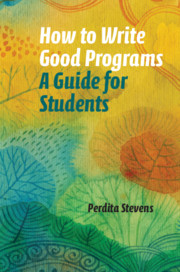
- Publisher:
- Cambridge University Press
- Online publication date:
- July 2020
- Print publication year:
- 2020
- Online ISBN:
- 9781108804783

Learning to program isn't just learning the details of a programming language: to become a good programmer you have to become expert at debugging, testing, writing clear code and generally unsticking yourself when you get stuck, while to do well in a programming course you have to learn to score highly in coursework and exams. Featuring tips, stories and explanations of key terms, this book teaches these skills explicitly. Examples in Python, Java and Haskell are included, helping you to gain transferable programming skills whichever language you are learning. Intended for students in Higher or Further Education studying early programming courses, it will help you succeed in, and get the most out of, your course, and support you in developing the software engineering habits that lead to good programs.
'Perdita Stevens’ book How to Write Good Programs provides a wealth of excellent advice tailored to beginning students of programming. It is language-agnostic, well structured, and delivered in an accessible manner. It might as well have the words 'Don’t Panic' in large, friendly letters on the cover.'
Jeremy Gibbons - University of Oxford
'This is the book I wish had existed during my time at university and at the beginning of my career! It explains fundamental concepts independently of a concrete programming language and contains many practical observations and tips to overcome situations where novice programmers tend to get stuck.'
Jennifer Tenzer - Senior Developer
'This is a unique book that feels like a conversation over a coffee with an experienced expert in computer programing. It is full of practical tips, insights, and folklore that will be of great benefit to anyone who wants to learn how to program well.'
Professor Tom Ward - University of Leeds
‘Stevens's book differs from other coding books in that it assumes minimal knowledge in its readers. She discusses the concept of 'program', clarifying which problem you want to solve and choosing a development environment, all before she gets to her concrete coding tips. Especially the chapter on how to fix mistakes is a boon to the novice programmer. Few things are as frustrating as accidentally throwing away working code or - worse - not being able to get your program back to working order. And for those who have finally mastered programming fairly well, but have difficulty with their schoolwork, Stevens concludes with two chapters on how to score well on homework assignments and exams.'
Karl van Heijster Source: De Leesclub van Alles
 Loading metrics...
Loading metrics...
* Views captured on Cambridge Core between #date#. This data will be updated every 24 hours.
Usage data cannot currently be displayed.